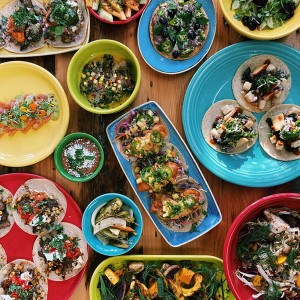Dining Out: Foreward Thinking
Fore Street
288 Fore Street, Portland, Maine
207-775-2717
Chef: Sam Hayward
I write often in praise of Sam Hayward and his Fore Street restaurant, in downtown Portland, because I think he's New England's closest equivalent to Alice Waters and that Fore Street should be as famous as her Berkeley restaurant, Chez Panisse. Take Fore Street's wood oven-roasted rope-cultured Maine mussels ($8.95), the country's plumpest, cleanest, best-flavored mussels roasted in an earthenware cazuela just until they are open and release their juices, perfumed and made into an intense dipping sauce by the brilliant addition of not-too-garlicky butter with a few flecks of burnt-crisp flaked almonds. Nothing could be simpler or more right.
I'll settle for moderately famous — a destination for Bostonians who like eating honest, locally raised food that tastes of itself, served in a marvelous urban setting near the picturesque Portland waterfront — and I'll keep on writing about Fore Street until it is. If you're a fan of Henrietta's Table at the Charles Hotel, where Peter Davis puts produce from Boston-area farms into his cheerful, generously portioned, fresh-tasting dishes, or of Brookline's Fireplace, the first nonprecious New England-themed restaurant, you'll want to build a stop at Fore Street into your next excursion Down East.
Already a Boston foodie trail goes straight up I-95, and not just in the months when everyone is heading off for weekends on the water. I'm one of a group of devoted fans who set aside long afternoons that turn into evenings — preferably out of season, when traffic will be light — for a Fore Street meal.
I joined the Hayward cult early, when the one-time rock-band bassist first traded life on the road for cooking. Running the kind of small one-man restaurant where I first found him was an idiosyncratic, hippie-ish dream when Hayward was getting his first professional cooking experience, in the mid-1970s. His self-financed form of attending cooking school was to work in several hard-driving kitchens in New York and New Orleans run by martinet French chefs. But he was more of a laid-back guy, having spent part of his childhood in Baton Rouge watching his Cajun-Choctaw neighbors prepare festive and long-cooked stews. He moved to Maine for good in 1977, and when he took ownership of his first restaurant, 22 Lincoln, it was in a hippie-ish place — Brunswick, the coastal town that is home to Bowdoin College. At 22 Lincoln, Hayward served meals whose every component he made himself, working with practically no staff and pouring most of his profits into increasingly better ingredients — including, in a Chez Panisse move, reserving pretty much everything grown by a nearby farmer named Frank Gross, who one day appeared at his kitchen door bearing leeks. You can see why the cult formed there and why the time and money he lavished on finding and preparing those ingredients helped put him out of business after 10 years.
Hayward, whose wife, Jan, had long helped pay the bills by working as an emergency-room nurse, opened a new restaurant in Portland in 1996. Business partners and a steadier dining public have allowed Fore Street to flourish. Portland is surprisingly similar to its Oregon counterpart: an enlightened, restored waterfront city and a liberal pocket in a state that is otherwise ferociously conservative. It's also a more convenient place for the Boston claque to get to; its followers have included plenty of chefs (such as Jim Solomon, owner of the Fireplace, who has called my comparison of his restaurant with Hayward's the highest honor he could hope for).
Eager as I am to see that claque swell, I have to warn you that Fore Street, in fact, has plenty of fans who keep it plenty busy. You're best off arriving before 6:30 or after 8:30 if you haven't booked a table; although the restaurant does take reservations, they're hard to get on summer weekends, and Fore Street's humane policy is to set aside a healthy percentage of tables for walk-ins. Anyway, it's fun and pleasant to have a drink at the bar while you wait, and you're likely to spot visiting celebs on their way to waterside retreats.
I have to give the Chez Panisse warning: In a restaurant where simplicity is a cardinal virtue and you've heard raves, you're going to be disappointed in at least one dish and probably more. When people tell you everything is good — a bad habit among Fore Street fans — you'll be on the lookout for flaws, and you'll find them. Execution can be uneven, doneness requests ignored, entrées delivered after too long a wait.
Also a surprise, considering Portland's long history as a fishing port: For reasons having to do with Hayward's own tastes and the fact that his business partner, Dana Street, has a nearby seafood restaurant called Street & Company, the dominant themes on the menu are meat and poultry. In fact, they're the kitchen's strong suits. This when the scenic ferries plying the lobster-filled Casco Bay are as much in evidence as the open kitchen, one wall of which is taken up by deep wood-fired ovens and rotating spits where tempting pork loins and whole rabbits and chickens turn slowly. Oh, there are those great mussels, and grilled or roasted fish entrées, too. But your head will be turned by those spits.
The emphasis on meat and poultry means that a core group of dishes changes little from season to season, a fact that provides comfort to those of us who can't get to the restaurant as often as we'd like and who look forward to, say, Hayward's marinated Maine farm rabbit. The seasons are always exalted, though, in salads, pastas, and especially in the side dishes, where both the real skill of the kitchen and Hayward's love of local produce shine.
For example, that rabbit. Only Barbara Lynch at No. 9 Park has such a way with a meat too many diners sentimentalize. Hayward's rabbit is always moist and meaty, with bones you want to pick up and scrape clean. It was served recently with a deep-flavored but not musty porcini sauce ($24.95). As spring turned to summer, Hayward put wild mushrooms with whichever menu fixtures they would best complement: morels with breast and confit of Long Island duckling ($25.95), and pheasant's back mushrooms with Maine island lamb ($25.95); he also made a wild mushroom and leek soup ($5.95). The spring accents included sorrel cream with Gulf of Maine skate wing ($17.95) and asparagus points in one of Hayward's celebrate-the-season salads, along with cress, Parmigiano-Reggiano, toasted pistachios, and lemon vinaigrette ($8.95). Fresh English peas were the star of pasta with Swiss chard, lemon-butter sauce, and pecorino ($12.95).
The accent is slightly Italian and slightly French — inevitable influences with any cook who came of age in the '70s and '80s. But it's mostly American, with a respect for food and the people who raise it, not to mention the customers who keep Fore Street in business. The taste is local and fresh. These are accents and values Chez Panisse helped spread, and Hayward is a mightily persuasive evangelist, backing those values with very good food. The next frontier: bringing desserts up to the level of the main courses so they're not the big dishes of browned things that are too reminiscent of the entrées. Chez Panisse did it, showing the country how to make desserts as seasonal and refined as any lovingly prepared vegetable ragout. I know Hayward can, too.


